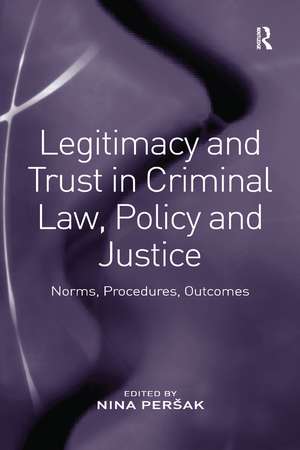Legitimacy and Trust in Criminal Law, Policy and Justice: Norms, Procedures, Outcomes
Autor Nina Peršaken Limba Engleză Paperback – 26 aug 2016
| Toate formatele și edițiile | Preț | Express |
|---|---|---|
| Paperback (1) | 469.34 lei 6-8 săpt. | |
| Taylor & Francis – 26 aug 2016 | 469.34 lei 6-8 săpt. | |
| Hardback (1) | 1109.66 lei 6-8 săpt. | |
| Taylor & Francis – 28 apr 2014 | 1109.66 lei 6-8 săpt. |
Preț: 469.34 lei
Nou
Puncte Express: 704
Preț estimativ în valută:
89.81€ • 96.04$ • 74.88£
89.81€ • 96.04$ • 74.88£
Carte tipărită la comandă
Livrare economică 17 aprilie-01 mai
Preluare comenzi: 021 569.72.76
Specificații
ISBN-13: 9781138270596
ISBN-10: 1138270598
Pagini: 208
Dimensiuni: 156 x 234 x 11 mm
Greutate: 0.45 kg
Ediția:1
Editura: Taylor & Francis
Colecția Routledge
Locul publicării:Oxford, United Kingdom
ISBN-10: 1138270598
Pagini: 208
Dimensiuni: 156 x 234 x 11 mm
Greutate: 0.45 kg
Ediția:1
Editura: Taylor & Francis
Colecția Routledge
Locul publicării:Oxford, United Kingdom
Notă biografică
Nina Peršak is a research professor in the field of Criminology and Sociology of Law, Faculty of Law, University of Ghent. Her research interests lie in the area of criminal law, criminology, criminal legal philosophy, victimology, sociology of law and social psychology.
Recenzii
’Recent world events have been viewed as indicative of a "crisis" in legitimacy, raising questions about trust in nation states, the legitimacy of legal institutions and the law. This edited collection makes a significant contribution to these contemporary debates by reflecting upon legitimacy, law and criminal justice within the EU.’ Margaret Malloch, University of Stirling, UK ’This book is an important contribution to the study of legitimacy and trust in criminal justice. It offers a rich discussion of various, descriptive as well as normative, aspects of legitimacy of criminal law, including European criminal law, which is particularly needed in light of this newly emerging field of law.’ Claes Lernestedt, Uppsala University, Sweden
Cuprins
Notes on Contributors, 1. Beyond Procedural Justice: Some Neglected Aspects of Legitimacy of Criminal Law, Policy and Justice, Part I. Legitimacy and Trust in Criminal Law and Policy: Principles and Implementation, 2. Norms, Harms and Disorder at the Border: The Legitimacy of Criminal Law Intervention through the Lens of Criminalisation Theory, 3. When Things Get Serious: Reflections on the Legitimacy of Local Administrative Sanctions in Belgium, 4. Legitimacy at Stake? Crimmigration Processes and the Criminal Justice System in the Netherlands, 5. Legitimacy and EU Criminal Law Regulation, Part II. Legitimacy and Trust in the Judiciary: Contradictions and Challenges, 6. Legitimacy and Trust-Related Issues of Judiciary: New Challenges for Europe, 7. Whose Claim is Legitimate Anyway? Negotiating Power in Inter-Agency Collaboration, 8. Mutual Recognition in EU Criminal Law and Its Effects on the Role of a National Judge, 9. Flaws and Contradictions in the Mutual Trust and Recognition Discourse: Casting a Shadow on the Legitimacy of EU Criminal Policy Making and Judicial Cooperation in Criminal Matters?, Part III. Concluding Thoughts, 10. Diverging Perspectives, Converging Thoughts? Common Themes and Prospects in Legitimacy Research, Index
Descriere
This interdisciplinary collection considers aspects of legitimacy and trust that have been neglected in previous studies. With contributions from across the EU, the book focuses on conceptions of legitimacy linked to criminal law norms, criminalisation and sanctioning; on EU legal and policy aspects of the phenomenon; and on specific court-related issues of legitimacy and trust. The study highlights the importance of trust in legal institutions of modern democracies and suggests ideas for future research in this area to challenge ways of thinking about legitimacy.













